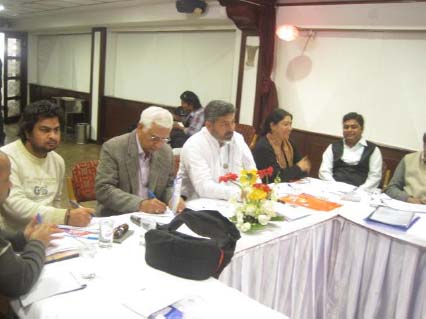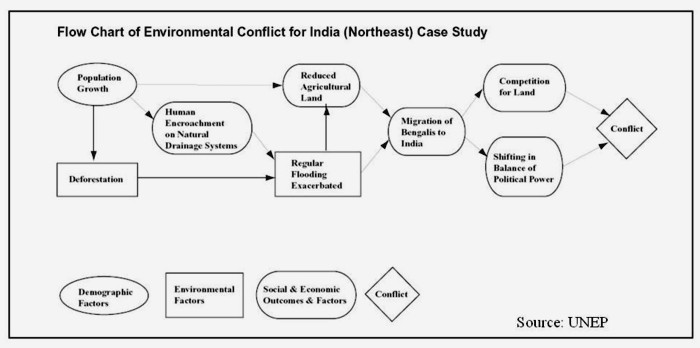Wastewater
Draft National Water Policy 2012 - Dialogue organised by NEER Foundation, Meerut on February 18, 2012
Posted on 27 Feb, 2012 10:07 AMGuest post by: Raman Kant Tyagi

Trends in private sector participation in the Indian water sector: A critical review - A Water and Sanitation Programme publication
Posted on 23 Feb, 2012 05:54 PMThe study also analyses the direction in which the sector is heading with respect to private sector participation. Since most PPPs are at early stages of operation, this study focuses only on learnings from PPP design and transaction. This study does not seek to assess the operating or financial performance of PPPs.
"In search of old ideas" - A discussion of the draft national water policy 2012, by Jayanta Bandopadhyay in The Telegraph
Posted on 22 Feb, 2012 05:05 PMAuthor: Jayanta Bandopadhyay
Article and image courtesy: The Telegraph
New water policy more contentious; least helpful in tackling existing issues
Posted on 22 Feb, 2012 12:34 PMAuthor : Dr. Arvind Kumar
"Water management in Mumbai: Prospects and challenges" - Videos from a round table organised by Observer Research Foundation
Posted on 16 Feb, 2012 03:51 PMThese four films include details of speeches made by the Municipal Commissioner of Brihan Mumbai Municipal Corporation (BMC), Mr Swadhin Kshatriya, who delivered a valedictory speech and Mr Sandeep Acharya, senior journalist from Loksatta, who expressed his views on the water crisis in Mumbai, as a part of a round table organised by Observer Research Foundation (ORF), on "Water management in Mumbai: Prospects and challenges", on the 10th of January 2010.
Multi-stakeholder dialogue is messy, but necessary
Posted on 16 Feb, 2012 01:32 PMA workshop on ‘Understanding and resolving water conflicts in the North East India', was organized by Forum for Policy Dialogue on Water Conflicts in India (Forum), in collaboration with Aaranyak (Guwahati), Centre for the Environment, IIT (Guwahati), Arghyam (Bangalore), SaciWATERs-CapNet Network (SCaN) and Cap-Net to discuss emerging issues related to water conflicts and their resolution in the region. This workshop was held in Guwahati on January 23-26, 2012. It aimed at presenting concepts and theory related water conflicts as well as issues especially relevant to the North East Region.

Stress of urban pollution on largest natural wetland ecosystem in East Kolkata - Causes, consequences and improvement
Posted on 14 Feb, 2012 10:23 AMThe impact of sewage pollution on these fish ponds and on the ecosystem is evaluated. Similarly, remedial measures to maintain water quality and to improve resource recovery efficiency are suggested.
CDD invites applications for Training on Decentralised Wastewater Treatment System, Bangalore – Apply by March 20, 2012
Posted on 13 Feb, 2012 08:25 AMConsortium for DEWATS Dissemination (CDD) Society, a not-for-profit organisation working in the field of decentralised basic need services across India.
Living rivers, dying rivers: Rivers in the Western Ghats
Posted on 10 Feb, 2012 04:12 PMRiver stories from Maharashtra: Many morals to learn
Parineeta Dandekar’s presentation began with an account of some statistics related to Maharashtra, the third largest state in India. Regarding the state of water resources in Maharashtra, she noted that of the five river basin systems, 55 percent of the dependable yield is available in the four river basins (Krishna, Godavari, Tapi and Narmada) east of the Western Ghats. These four river basins comprise 92 percent of the cultivable land and more than 60 percent of the population in rural areas. 45 percent of the state's water resources are from west flowing rivers which are mainly monsoon specific rivers emanating from the Western Ghats and draining into the Arabian Sea.
With 1821 large dams and more in the offing, Maharashtra has the maximum dams in the country (35.7%). However, the proportion of gross irrigated area vis a vis the gross cropped area at 17.8 percent is much lower than the national average of 44.6 percent. The contradictions from the state, which is home to the highest number of dams, were discussed. In nearly 70 percent of the state’s villages (around 27,600 villages), water is either not available within 500 metres distance, or within 15 metres below ground level or when available is not potable (World Bank, Promoting Agricultural Growth in Maharashtra, Volume 1, 2003).
Dandekar discussed the World Bank funded Maharashtra Water Sector Improvement Project (MWSIP) initiated in 2005 whose main components were establishment, operationalisation and capacity building of Maharashtra Water Resources Regulatory Authority (MWRRA); establishment of river basin agencies in Maharashtra; and restructuring and capacity building of the Water Resources Department. The MWRRA Act (2005) has been amended, taking out the clause for equitable water distribution, and granting the Cabinet the rights to have the last say about water entitlements. This has led to a diversion of water for irrigation from the vulnerable, suicide-prone Vidarbha region to thermal power plants. According to Prayas, “entitlements of more than 1500 MCM have been changed from agriculture to industries and cities”.

Water quality monitoring of lakes in and around Bangalore city
Posted on 07 Feb, 2012 03:05 PMIt describes the efforts undertaken by the Karnataka State Pollution Control Board to launch a programme to monitor the water quality of some of the lakes in Bangalore so as to focus the attention of concerned governmental organisations to take up remedial measures to safe guard the water bodies of the "Garden City".
The sources of pollution in lakes are mainly identified as:






